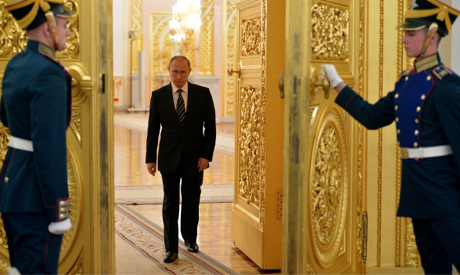
Russia’s President Vladimir Putin, center, enters a hall to attend a meeting with senior officers of the Defense Ministry and other government agencies in the Kremlin in Moscow, Russia, Tuesday, Oct. 20, 2015 (Photo: AP)
Russian President Vladimir Putin's approval rating has hit a record high of almost 90 percent, primarily as a result of his decision to launch air strikes against Islamist militants in Syria, Russia's state pollster said on Thursday.
VTsIOM, the pollster, said Putin's rating had reached 89.9 percent in October, up from a previous high of 89.1 percent in June. In January 2012, it put his rating at 58.8 percent.
"Such a high level of approval for the work of the Russian president is linked, in the first instance, to events in Syria, to Russian air strikes on terrorist positions there," VTsIOM said in a statement.
Russia's air force says it has flown over 700 sorties against more than 690 targets in Syria since Sept. 30, a campaign to which state TV has given blanket coverage.
Before the strikes, polls showed Russians were wary about the risks of Kremlin involvement in the Middle East. But a poll conducted earlier this month showed that 72 percent had a broadly positive opinion of the Russian air campaign.
Putin, whose third term as president lasts until 2018, has enjoyed a rating of over 80 percent for more than a year and a half, VTsIOM said.
The country's other main pollster, the Levada Center, which is not linked to the Kremlin, has also registered strong public approval for Putin, saying he scored a rating of 83 percent in August this year.
VTsIOM said Putin's rating had begun to grow strongly in spring last year, a period that coincided with Russia's annexation of Ukraine's Crimea peninsula.
Putin, whose words and actions dominate state TV, where an overwhelming majority of Russians get their news, has not yet said whether he intends to stand for a fourth presidential term in 2018. If he did, he could remain in power until 2024.
VTsIOM said it had reached its findings by interviewing 1,600 people in 130 different parts of Russia from Oct. 17-18. It said the margin of error was not greater than 3.5 percent.
Short link: